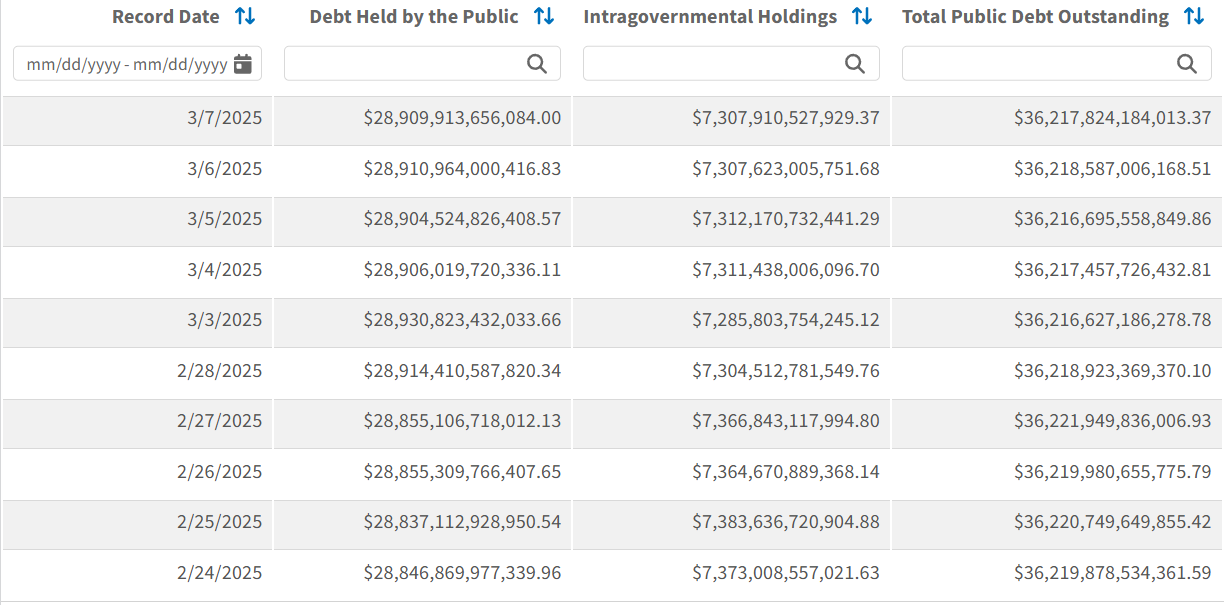US President Trump successfully returned to the White House with the slogan "Make America Great Again". However, since he took office on January 20th this year, a series of economic policies have been continuously exacerbating people's concerns about an economic recession. The US stock market has been under constant pressure in the past two weeks, with the S&P 500 index retreating from its historical high of 6,144.15 points on February 19th to the current 5,563.70 points. Bitcoin has also been dragged down, falling back to the level when Trump won the election in November last year.
This has also made many investors start to fear that the stock and cryptocurrency markets seem to have entered a bear market.
Is Trump Deliberately Causing an Economic Recession?
The current turmoil in the capital market has made many people dissatisfied with Trump's economic policies, and some even begin to miss the rule of the Biden administration. However, there are also voices that believe Trump may be deliberately triggering a controllable economic recession, with the ultimate goal of solving the unsustainable debt problem currently facing the United States.
The author will analyze Trump's potential economic intentions from this perspective.
Background: The Serious US Debt Crisis
According to the latest data from the US Treasury, the total US debt has now reached a scale of $36.2 trillion and is still growing rapidly, undoubtedly posing a huge challenge to the US economy.

How Much Interest Can the Fed Save by Cutting Rates?
According to statistics, the US GDP in 2023 is expected to be around $27.72 trillion. Based on this figure, the current total US debt is already more than one times its GDP, and the US government's annual spending on debt interest alone exceeds $1.3 trillion.
However, calculations show that if the interest rate is lowered by 1%, it would save the US $400 billion in debt interest, which is undoubtedly a huge attraction for Trump.
Trump Manufactures an Economic Recession, Causing Interest Rates to Plummet
Regarding the interest rate cut, Bear Traps Report founder Larry McDonald pointed out that no inflationary cycle with an inflation rate above 6% can end without the unemployment rate reaching 5%, 6%, or even 8%. Therefore, Trump cannot suppress the progress of inflation through large-scale fiscal spending, and the best way is to trigger an economic recession.
With this premise, let's look at Trump's current economic policies:
- High Tariffs: In late January and early February, Trump first launched a tariff war, imposing 25% tariffs on Canada and Mexico, and imposing tariffs on China, and then imposing reciprocal tariffs.
- Layoffs: Trump has teamed up with TRON founder Musk to establish the Government Efficiency Department (DOGE), conducting large-scale layoffs of US government employees and reducing public spending.
- Restricting Immigration: Trump emphasized in his inauguration speech that he would implement strict immigration policies.
Overall, tariffs will lead to rising prices, while layoffs and strict immigration policies will compress economic activity in the labor market. This series of measures will potentially put pressure on the US economy, and this result may lead to the US Federal Reserve (Fed) being forced to cut interest rates, as its most important goal is to ensure stable inflation and unemployment.
Can Trump Succeed?
Optimists believe that the current shocks to the stock and cryptocurrency markets may only be the short-term pains of Trump's economic reforms, and in the long run, Trump is expected to alleviate the US debt crisis and achieve sustainable development of US fiscal policy, while also stimulating economic recovery.
However, pessimists believe that Trump's high-risk gamble of using an economic recession as a bargaining chip, if it gets out of control, may trigger an even more severe economic recession. Under long-term stagnation, the employment and living standards of the people will be greatly discounted, and the geopolitical risks will also rise due to high tariffs and restrictions on immigration.
Of course, there are also those who believe that the economic recession is merely a side effect of Trump's current economic policies, and not his intentional action. However, regardless of the situation, the current economy does have a lot of uncertainty, and whether Trump can fulfill his promise to "Make America Great Again" remains to be seen.








